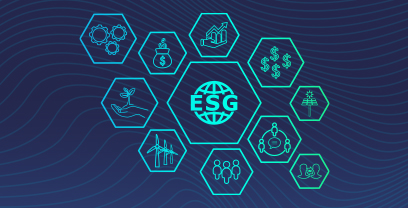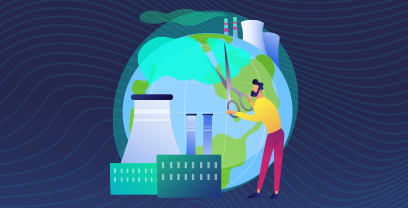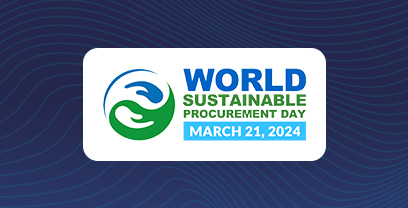As organizations worldwide grapple with the challenges of climate change, resource scarcity, and social responsibility, integrating sustainability principles into supply chain management has emerged as a strategic imperative. Embracing sustainability not only aligns with ethical and environmental considerations but also offers a multitude of benefits for businesses, ranging from cost savings and risk mitigation to enhanced reputation and innovation.
Research from HBR reveals that more than 55% of organizations view sustainability as an important strategic initiative, and that consumers are willing to pay 2-10% more for products from companies that provide supply chain transparency.
Amidst this paradigm shift, Ivalua’s Procurement platform stands out as a powerful tool for driving sustainability initiatives forward. In this blog post, we’ll examine why organizations are increasingly adopting supply chain sustainability solutions, and how Ivalua can assist them in achieving their ESG objectives.
International Laws on Supply Chain Sustainability
Europe is at the forefront of enacting robust sustainable supply chain legislation, a sweeping framework that addresses the multifaceted nature of environmental stewardship, social accountability, and ethical corporate conduct.
These regulations are crafted to promote a holistic approach to sustainability, ensuring that the intricate web of supply chains operate within stringent guidelines, safeguarding our planet and its inhabitants while fostering a landscape of integrity in business operations.
The European Green Deal, along with the Circular Economy Action Plan, represents the European Union’s ambitious agenda to create a sustainable economy by transitioning to a clean, circular economy, restoring biodiversity, and cutting pollution.
At the heart of this transition are Environmental, Social, and Governance (ESG) considerations aimed at fostering sustainable and resilient supply chains. The Green Deal sets a target for the EU to become climate neutral by 2050, requiring significant reductions in greenhouse gasses, promoting clean energy and demanding sustainable industry practices. These objectives necessitate radical changes in supply chain operations, including the reduction of carbon footprints, enhancing recycling and improving energy efficiency across the board.
The Circular Economy Action Plan further specifies the mechanisms by which sustainability in supply chains can be achieved, focusing on the entire lifecycle of products from design and manufacturing to consumption and disposal.
It introduces measures to stimulate the market for sustainable and circular products, including stricter recycling quotas, and rules for waste management. A notable aspect is the regulation concerning the “right to repair,” aimed at extending the lifecycle of products.
Additionally, the plan puts an emphasis on reducing waste and outlines a comprehensive strategy to prevent waste generation which is fundamental for achieving a circular economy. According to the European Commission, implementing the Circular Economy Action Plan could reduce EU’s industrial emissions by up to 56% by 2050, showcasing the EU’s commitment to leading globally on sustainable supply chain practices.
While the United States lacks comprehensive federal legislation specifically targeting sustainable supply chains, these laws and initiatives reflect a growing awareness of the importance of ethical and environmentally responsible practices in supply chain management.
In the United States, laws and regulations regarding sustainable supply chains primarily focus on environmental protection, labor rights and ethical sourcing practices. Key legislation includes the Federal Acquisition Regulation (FAR) and the Federal Sustainability Program, which require federal agencies to prioritize sustainable procurement practices, including the purchase of environmentally preferable products and services.
The California Transparency in Supply Chains Act (SB 657) mandates certain companies to disclose their efforts to eradicate slavery and human trafficking from their supply chains. Furthermore, voluntary standards such as the Sustainable Forestry Initiative (SFI) and the Responsible Business Alliance (RBA) Code of Conduct provide guidelines for sustainable sourcing and ethical labor practices.
These laws reflect a growing recognition of the importance of sustainability and environmental protection globally, particularly in addressing climate change and promoting renewable energy sources.
What Is Supply Chain Sustainability?
Supply Chain Sustainability refers to the effort by a company to control the environmental, social, and economic impacts within its supply chain. This approach goes beyond the immediate interests of the company to address the full scope of issues it encounters in the process of delivering a product or service from supplier to customer.
The goal is not only to minimize the negative impacts but also to create a positive influence on the global community and the environment. From an environmental standpoint, supply chain sustainability focuses on reducing carbon footprints, enhancing energy efficiency, utilizing sustainable materials and minimizing waste associated with recycling and packaging.
Socially, it involves ensuring fair labor practices, safe working conditions and community engagement across the supply chain. Economically, it seeks to create value for all stakeholders, including fair pricing and long-term viability for businesses at every link of the supply chain.
Supply chain sustainability is driven both by ethical considerations and by practical benefits. Companies practicing sustainability can often achieve greater efficiency and cost savings, enhance their brand reputation and foster innovation.
Data from various sectors suggest that companies that integrate sustainability into their supply chains tend to perform better in the long run, indicating that sustainability is not just a moral imperative but a critical component of modern business strategy.
Learn more in our blog on procurement’s role in supply chain sustainability.
Why Are Sustainable Supply Chains Important?
Sustainable supply chains are not only important — they are essential for the health of our planet, the well-being of its inhabitants and the success of the economy. They represent a fundamental shift in how companies operate, underscoring the interconnectedness of economic growth, environmental stewardship and social responsibility.
In a recent report, EY surveyed 525 executives about their sustainable supply chain practices. The graph below summarizes the top motivators for improving supply chain sustainability.

Graph Image Sourced from EY
Collaboration, transparency and circular practices play pivotal roles in achieving sustainability goals within supply chains.
- Collaboration among stakeholders, including suppliers, manufacturers, retailers and consumers, fosters collective action towards sustainable practices.
- Transparency ensures that information about product origins, manufacturing processes, and environmental impacts is readily available to all parties involved, facilitating informed decision-making and accountability.
- Circular practices, such as waste reduction, recycling and product reuse, help minimize resource consumption and environmental footprint throughout the supply chain lifecycle.
Digital technologies, including supply chain sustainability software, play a crucial role in enabling these practices, by providing tools for tracking and monitoring environmental and social performance metrics across the supply chain.
Supply chain sustainability solutions like Ivalua facilitate data collection, analysis and reporting, allowing businesses to identify areas for improvement and measure progress towards sustainability goals. Additionally, these digital platforms enable real-time communication and collaboration among supply chain partners, streamlining information sharing and decision-making processes.
Understanding the Challenges in Sustainable Supply Chains
We’ve learned that creating a sustainable supply chain is fraught with challenges, including high costs, particularly for smaller enterprises. Global complexity and a lack of transparency in supply chains can obstruct efforts to address environmental and ethical issues. Technological adoption is challenging for those without infrastructure or expertise.
Sustainability in supply chains is a dynamic objective, necessitating ongoing evaluation and adaptation to keep pace with new trends, technologies, and regulations. A proactive approach is vital, with an emphasis on continuous improvement. Companies striving for sustainability must regularly review and assess their supply chain operations to improve efficiency, environmental performance, and social outcomes.
Incorporating new technologies and practices, while demanding, is essential to advance sustainability goals. Overcoming these barriers requires leveraging innovative solutions, including blockchain and AI, within a comprehensive and agile management framework.
According to McKinsey, “Digital technology has also increased companies’ ability to assist large numbers of suppliers. In 2014, Walmart launched a program to help thousands of its Chinese suppliers make their factories more energy efficient through the use of an online tool. The program has enabled the average supplier to reduce its energy consumption by an average of 10 percent.”
Enhancing supplier relationships and building their capacities in sustainability are critical for maintaining ethical and environmental integrity within the supply chain. This is where the role of procurement becomes central, as it ensures the meeting of corporate sustainability goals by strategically choosing suppliers and embedding sustainability considerations into procurement practices

Benefits of a Sustainable Supply Chain
Sustainable supply chains offer a “triple benefit” package—environmental, economic, and social advantages—for businesses and their communities. By prioritizing supply chain sustainability, companies can forge a path that not only minimizes their environmental impact but also enhances efficiency, builds a stronger brand, and supports global efforts to create a more equitable and sustainable world.
Below, we list the key benefits of adopting sustainable procurement & ESG objectives:
- Environmental Conservation: Sustainable supply chains reduce environmental degradation by minimizing resource consumption, lowering greenhouse gas emissions and preventing pollution.
- Cost Savings: By optimizing resource usage, reducing waste and improving energy efficiency, businesses can lower operational expenses and enhance overall profitability.
- Enhanced Reputation and Brand Image: Demonstrating a commitment to environmental and social responsibility can attract loyal customers, investors and business partners.
- Regulatory Compliance: Adhering to sustainability standards and regulations ensures compliance with legal requirements and mitigates the risk of fines, penalties and legal disputes.
- Risk Mitigation: Sustainable supply chains are more resilient to external risks such as resource scarcity, regulatory changes and supply chain disruptions.
- Innovation and Differentiation: Businesses that embrace sustainable practices often develop innovative products, services and business models that differentiate them from competitors and create new market opportunities.
- Long-term Value Creation: By prioritizing the well-being of employees, communities and the environment, businesses can build a foundation for sustainable growth and prosperity in the years to come.
Best Practices for Creating a Sustainable Supply Chain
Procurement plays a decisive role in the circular economy, enabling companies to become resilient, regenerative and competitive. Creating a sustainable supply chain requires a comprehensive approach that goes beyond simple environmental compliance to encompass corporate social responsibility (CSR), economic viability and long-term resilience.
Engaging suppliers in sustainability initiatives, promoting ethical labor practices, reducing carbon emissions and fostering circular economy practices are foundational steps, as well. It’s also critical to implement energy-efficient measures, optimize transportation routes and integrate renewable resources to further minimize environmental impact and drive cost savings.
Embracing technology, such as data analytics and supply chain transparency solutions, enables companies to track sustainability metrics, monitor progress and identify areas for improvement.
Employee training and awareness programs empower employees to understand the importance of sustainability and acquire the knowledge and skills needed to implement sustainable initiatives. By fostering a culture of sustainability through education and awareness, employees become catalysts for innovation, efficiency and continuous improvement.
Discover how to achieve this transition, what the concrete levers are and what transformations need to be carried out in terms of purchasing practices, buyer skills, purchasing organizations, ecosystem management and performance measurement. In this whitepaper by Dr. Natacha Tréhan, she clarifies what the circular economy really is, beyond myths and presents current and future legislation.
How IKEA Successfully Created a Sustainable Supply Chain
IKEA is a global company of over 217,000 co-workers, offering more than 9,500 products online and through 500 locations globally, with the vision of making life easier for their guests. Ikea’s 1,600+ global suppliers play a vital role in this vision. IKEA has implemented a strict supplier Code of Conduct, called “IWAY,” which consists of four key requirements:
- Improve environmental impacts
- Secure decent and meaningful work for workers
- Respect children’s rights
- Improve welfare for animals
Leveraging the Ivalua platform, IKEA conducts an annual classification audit whereby they actively review supplier’s compliance with the code and re-classify as necessary. As a part of this process they visit manufacturers and factories around the world reviewing the impact of their company practices.
By ensuring raw materials are sourced ethically and optimizing energy use, IKEA is fostering a more sustainable and responsible use of our planet’s resources. Prioritizing co-worker engagement and respecting human and animal rights contributes to a company-wide culture which defines IKEA as a reputable and responsible brand. Consequently, sustainable suppliers are highly interested in forming partnerships with IKEA.
Watch this presentation, which outlines IKEAs sustainable supply chain strategy and best practices.
Create Sustainable Supply Chains With Ivalua
Ivalua’s supply chain sustainability software offers a comprehensive solution for automating and streamlining sustainability processes while enhancing visibility and control over spending.
By centralizing data related to suppliers, materials and sustainability metrics, Ivalua enables easy access and analysis of relevant information. It facilitates supplier management by assessing and monitoring supplier sustainability performance, identifying and mitigating risks and ensuring compliance with regulatory requirements and sustainability standards. Users can monitor key sustainability metrics, track progress towards sustainability goals and promote responsible sourcing practices by enhancing transparency into supplier practices, product origins, and supply chain processes.
Ivalua’s Environmental Impact Center provides reliable data to help organizations generate emission baselines and collaborate with suppliers on sustainability objectives. Using the EIC, organizations can:
- Drive transparency into scope 3 emissions
- Assess environmental performance and manage risk
- Identify and prioritize opportunities
- Manage emissions at category and product level

Watch this EIC demo to explore more on Ivalua’s Environmental Impact Center.
Conclusion
Sustainability has become not just a moral imperative; it’s a strategic necessity, driving positive change and ushering in a more sustainable future. Through a concerted commitment to sustainability, companies not only mitigate environmental damage brought about by industry, but they also unlock significant cost savings while enhancing their reputation and ensuring compliance with regulations.
Ivalua’s Sustainable Supply Chain software helps companies to achieve these objectives by enabling transparency, traceability and compliance across their supply chain, and allowing organizations to track and report on sustainability metrics, supplier performance and environmental impacts. Ivalua’s advanced capabilities empower organizations to make informed decisions, optimize procurement processes and drive tangible progress towards building a more sustainable and resilient supply chain ecosystem.




